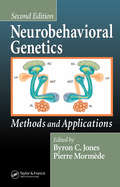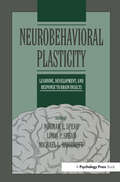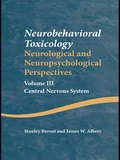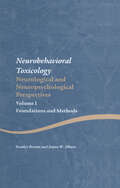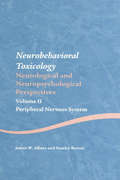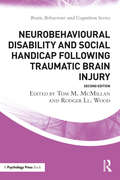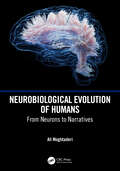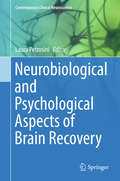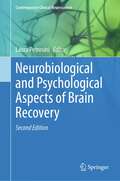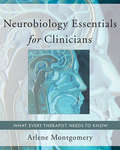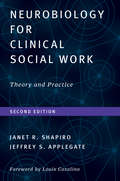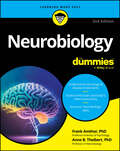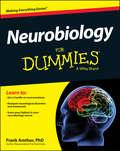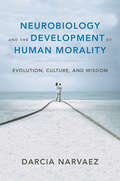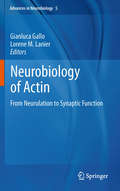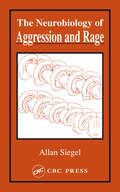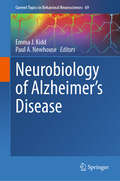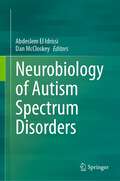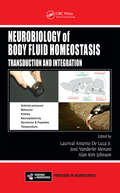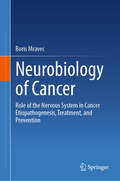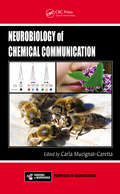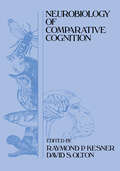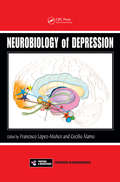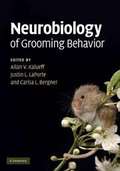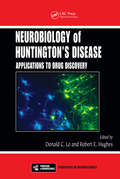- Table View
- List View
Neurobehavioral Genetics: Methods and Applications, Second Edition
by Byron C. Jones D. V. M. Pierre MormèdeA complete background to concepts and principles of behavioral genetics, Neurobehavioral Genetics: Methods and Applications, Second Edition features a broad spectrum of the most current techniques in neurobehavioral genetics in a single source. International researchers incorporate several new developments in the field, including:De
Neurobehavioral Plasticity: Learning, Development, and Response to Brain Insults
by Robert L. IsaacsonThis book describes a unique combination of research programs based on a striking variety of hypotheses and procedures directed toward understanding the sources and consequences of neurobehavioral plasticity. This remarkable attribute of the nervous system -- to be pliable and capable of being shaped or formed by natural or artificial sources toward adaptation or maladaptation -- is considered in terms of the neurochemical forces and neuroanatomical structure that has been found to be pivotal for this function. The impetus for this volume was a symposium held to honor Robert L. Isaacson for his scientific and pedagogical achievements as well as his contributions to behavioral neuroscience. Corresponding to his three major research interests, the book is divided into three sections as follows: * the first explores the relationship between the limbic system and behavior, with an emphasis on learning and memory; * the second considers -- through a wide range of approaches -- issues of plasticity in behavior and brain; and * the third deals with neural and chemical determinants of normal and abnormal behavior. This volume is not only a fitting tribute to Isaacson, but also an unusual collection of new evidence, procedures, and theories destined to have significant influence on behavioral neuroscience.
Neurobehavioral Toxicology: Central Nervous System (Studies on Neuropsychology, Neurology and Cognition)
by Stanley Berent James W. AlbersThis is the final volume in a three-volume work that has addressed the scientific methodologies relevant to clinical neurobehavioral toxicology. Volume I focused on basic concepts and methodologies in Neurobehavioral Toxicology, with Volume II focusing on the peripheral nervous system. Volume III attends to what is known about industrial and environmental chemicals, medicines, and substances of abuse and how these agents affect the central nervous system. All substances have the capacity to be toxic, depending on factors that include the physical properties of the chemical or compound, organism related variables, or interaction between the two. These substances on the other hand and as a result of these same factors might be used therapeutically or even recreationally. The difference between medicine, recreational drug, or poison depends often on a careful balance between adverse and intended effects. How to determine that a specified substance has caused harm is emphasized in the present volume by way of case examples and discussion. Illnesses and behavioral variations that compete with toxicant-induced explanations for findings in a given case, as well as the various controversies that can arise around issues of diagnosis and causal determination, are treated comprehensively in this volume.
Neurobehavioral Toxicology: Foundations and Methods (Studies on Neuropsychology, Neurology and Cognition #5)
by Stanley Berent James W. AlbersThis book, the first of three volumes, provides a thorough background to the emerging field of neurobehavioral toxicology by looking at current clinical approaches and tests, as well as assessing current clinical research. The analysis of the impact of toxins on the human nervous system is particularly pertinent given the ongoing expansion of pharmaceuticals, industrial hazards, biological warfare and global pollution. A comprehensive introduction to neurobehavioral toxicology, this work will be of interest to practicing neurologists and neuropsychologists, as well as to occupational medicine physicians and medical toxicologists.
Neurobehavioral Toxicology: Peripheral Nervous System (Studies on Neuropsychology, Neurology and Cognition #5)
by Stanley Berent James W. AlbersThis book, the second of three volumes, concentrates on peripheral nervous system disorders. Examining the effects of neurotoxicants on nerve, muscle and the neuromuscular junction, it builds on the scientific principles outlined in volume 1 by looking at the application of the methods discussed, particularly in terms of the evaluation and diagnosis of individual patients and the related process of establishing causation. Neurobehavorial Toxicology, Volume 2 will be of interest to practicing neurologists and neuropsychologists, as well as to occupational medicine physicians and medical toxicologists.
Neurobehavioural Disability and Social Handicap Following Traumatic Brain Injury (Brain, Behaviour and Cognition)
by Tom M. McMillan Rodger Ll WoodNeurobehavioural disability (NBD) follows many forms of serious brain injury and is a major constraint on social independence. This book brings together a group of leading academics and practising clinicians to provide an overview of the nature of NBD, considering how it translates into social handicap, and what can be done to address associated problems, through social and behavioural rehabilitation, vocational training and family education. This fully revised edition takes into account advances in the field, exploring the range of cognitive, emotional, and behavioural effects of brain damage most commonly associated with damage to the frontal and associated structures of the brain that govern social behaviour. This edition also features increased emphasis on psychological interventions, as well as new chapters on brain imaging, pharmacotherapy and assistive technology for disability. Neurobehavioural Disability and Social Handicap Following Traumatic Brain Injury is essential reading for clinical psychologists, psychiatrists and neurologists working in brain injury rehabilitation. The book will also be of interest to relatives of those with brain injury seeking better knowledge to understand neurobehavioural disability, as well as the growing number of therapy care assistants, case managers, support workers, and social workers responsible for the day to day care of brain injured people in the community.
Neurobiological Evolution of Humans: From Neurons to Narratives
by Ali MoghtaderiOur perception of the brain structure and function as an organ full of secrets and mysteries must change, and it is necessary to consider it as a part of the body that is constantly evolving and developing to maintain homeostasis for the entire human organism. New fossils, imaging methods, molecular genetics, comparative anatomy, evolutionary psychology, cognitive concepts in neuroscience, and neurology have made it possible to address questions of the neurological evolution of humans. This book integrates disparate findings from those disciplines in a succinct history by explaining how evolutionary process occurred, reshaped our brain, reconstructed our mind, and finally changed our "selves."Key Features Explains complex scientific concepts in neurobiology using lucid prose and maintaining a clear narrative Provides well-documented arguments supported by hundreds of references and citations Documents a complex history which unfolded over millions of years Offers new approaches intended to transform ideas, opinions, and intellectual foundations of the brain
Neurobiological and Psychological Aspects of Brain Recovery (Contemporary Clinical Neuroscience)
by Laura PetrosiniThe novelty of this book's approach lies in addressing the impact of neurobiological factors as well as psychological influences on brain recovery. There is growing evidence that emotional, motivational, and cognitive factors along with personality traits play a crucial role in brain plasticity, resilience, and recovery. Topics include synaptic and neuronal plasticity, development of brain reserves, biological markers, environmental factors, psychological profile, emotional resilience, and personality traits. By combining the latest research on neural mechanisms and on psychological resilience the authors hope that this book can lead to the development of better treatment strategies for functional recovery from brain damage.
Neurobiological and Psychological Aspects of Brain Recovery (Contemporary Clinical Neuroscience)
by Laura PetrosiniThe importance of this unique book's approach lies in addressing the impact of neurobiological factors as well as psychological influences on brain recovery following injury. There is growing evidence that emotional, motivational, and cognitive factors along with personality traits play a crucial role in brain plasticity, resilience, and recovery. Topics include synaptic and neuronal plasticity, development of brain reserves, biological markers, environmental factors, emotional resilience, and personality traits. By combining the latest research on neural mechanisms and psychological resilience the authors present a book that will help lead to the development of better treatment strategies for functional recovery from brain damage. The new edition is fully updated throughout and contains completely new chapters on brain recovery in childhood, epigenetic aspects of brain recovery, and artificial intelligence techniques in traumatic brain injury research.
Neurobiology Essentials for Clinicians: What Every Therapist Needs to Know
by Arlene Montgomery Allan N. SchoreThis book presents an overview of the latest theories of affect regulation and focuses on how these theories work in clinical settings and how therapists can be taught to implement them. The notion of teaching and learning will be extended by the theories themselves-the author presents methods of education that enact the theories being taught. The book is divided into eight chapters, each one highlighting a particular structure or related structures of the brain. Suggestions for learning how to clinically apply the neurobiological/neuroanatomical information are offered. What is so unique about this book is that the bulk of the chapters are clinical dialogue, accompanied by neurobiological commentary. Thus, readers can see for themselves, during the course of parts of sessions, just how a "neurobiological outlook" can inform therapeutic understandings of what clients are doing and saying. The result is a very user-friendly learning experience for readers, as they are taken along a journey of understanding various brain systems and how they relate to psychotherapeutic principles. Elegantly bridging the gap between the academic and clinical domains, this book is essential for anyone interested in the application of neurobiological principles to psychotherapy and wishes to learn about neurobiology without feeling overwhelmed or intimidated.
Neurobiology For Clinical Social Work, Second Edition: Theory And Practice (Norton Series On Interpersonal Neurobiology Ser. #0)
by Jeffrey S. Applegate Janet R. ShapiroDemystifying neurobiology and presenting it anew for the social-work audience. The art and science of relationship are at the core of clinical social work. Research in neurobiology adds a new layer to our understanding of the protective benefits of relationship and specifically, to our understanding of the neurobiology of attachment and early brain development. This second edition of Neurobiology for Clinical Social Work explores the application of recent research in neuroscience to prevention and intervention in multiple systems, settings, and areas such as the neurobiology of stress and the stress response system, the impact of early adversity and toxic stress on brain development, early childhood and adolescent brain development, and the application of this science to prevention and intervention in areas such as child welfare and juvenile justice. Social workers collaborate with individuals, families, communities, and groups that experience adversity, and at times, traumatic stressors. Research in neuroscience adds to our models of risk and resilience; informing our understanding of the processes by which adversity and trauma impact multiple indicators of wellbeing across time. Social workers can use this knowledge to inform their work and to support the neuroprotective benefit of relationship in the lives of individuals, families, and communities. This text provides essential information for cutting-edge social work practice.
Neurobiology For Dummies
by Frank Amthor Anne B. TheibertAn essential guide to help you demystify the complex topic of neurobiology and jump into this fascinating scientific field Neurobiology is a notoriously difficult subject, but Neurobiology For Dummies explains the essentials in terms anyone can understand. This fun and accessible book covers the fundamentals, covering the anatomy, physiology, and pathology of the nervous system. Students in fields like neuroscience and pharmacology will get a complete overview of the molecular and cellular mechanisms of the nervous system, making it easier to complete coursework and pass exams in introductory neurobiology courses. In this updated edition, fresh examples highlight the latest research, so you'll be prepared with a current understanding of the science. Whatever your ultimate career destination, this Dummies guide will help you get neurobiology under your belt. Get easy-to-understand explanations of complex topics in neurobiology Understand the latest breakthroughs in neurological disease treatments Learn about the fascinating ways that the brain and body are interconnected Supplement your neurobiology textbook and prepare for your exam This is the perfect resource for students majoring in neuroscience, biology, cognitive science, medicine, and beyond. With Neurobiology For Dummies as a supplement, you can sail through any introductory neurobiology course.
Neurobiology For Dummies
by Frank AmthorThe approachable, comprehensive guide to neurobiology Neurobiology rolls the anatomy, physiology, and pathology of the nervous system into one complex area of study. Neurobiology For Dummies breaks down the specifics of the topic in a fun, easy-to-understand manner. The book is perfect for students in a variety of scientific fields ranging from neuroscience and biology to pharmacology, health science, and more. With a complete overview of the molecular and cellular mechanisms of the nervous system, this complete resource makes short work of the ins and outs of neurobiology so you can understand the details quickly. Dive into this fascinating guide to an even more fascinating subject, which takes a step-by-step approach that naturally builds an understanding of how the nervous system ties into the very essence of human beings, and what that means for those working and studying in the field of neuroscience. The book includes a complete introduction to the subject of neurobiology. Gives you an overview of the human nervous system, along with a discussion of how it's similar to that of other animals Discusses various neurological disorders, such as strokes, Alzheimer's disease, Parkinson's disease, and schizophrenia Leads you through a point-by-point approach to describe the science of perception, including how we think, learn, and remember Neurobiology For Dummies is your key to mastering this complex topic, and will propel you to a greater understanding that can form the basis of your academic and career success.
Neurobiology and the Development of Human Morality: Evolution, Culture, and Wisdom (Norton Series on Interpersonal Neurobiology)
by Allan N. Schore Darcia NarvaezA wide-ranging exploration of the role of childhood experiences in adult morality. Moral development has traditionally been considered a matter of reasoning--of learning and acting in accordance with abstract rules. On this model, largely taken for granted in modern societies, acts of selfishness, aggression, and ecological mindlessness are failures of will, moral problems that can be solved by acting in accordance with a higher rationality. But both ancient philosophy and recent scientific scholarship emphasize implicit systems, such as action schemas and perceptual filters that guide behavior and shape human development. In this integrative book, Darcia Narvaez argues that morality goes "all the way down" into our neurobiological and emotional development, and that a person's moral architecture is largely established early on in life. Moral rationality and virtue emerge "bottom up" from lived experience, so it matters what that experience is. Bringing together deep anthropological history, ethical philosophy, and contemporary neurobiological science, she demonstrates where modern industrialized societies have fallen away from the cultural practices that made us human in the first place. Neurobiology and the Development of Human Morality advances the field of developmental moral psychology in three key ways. First, it provides an evolutionary framework for early childhood experience grounded in developmental systems theory, encompassing not only genes but a wide array of environmental and epigenetic factors. Second, it proposes a neurobiological basis for the development of moral sensibilities and cognition, describing ethical functioning at multiple levels of complexity and context before turning to a theory of the emergence of wisdom. Finally, it embraces the sociocultural orientations of our ancestors and cousins in small-band hunter-gatherer societies--the norm for 99% of human history--for a re-envisioning of moral life, from the way we value and organize child raising to how we might frame a response to human-made global ecological collapse. Integrating the latest scholarship in clinical sciences and positive psychology, Narvaez proposes a developmentally informed ecological and ethical sensibility as a way to self-author and revise the ways we think about parenting and sociality. The techniques she describes point towards an alternative vision of moral development and flourishing, one that synthesizes traditional models of executive, top-down wisdom with "primal" wisdom built by multiple systems of biological and cultural influence from the ground up.
Neurobiology of Actin
by Gianluca Gallo Lorene M LanierThis text is an introduction to the interface between the actin cytoskeleton and the myriad of issues fundamental to the understanding of the nervous system. It covers the neurobiology of actin ranging from basic cellular organization and function to the roles of actin in the health and disease states of the nervous system. Its opening chapter presents the fundamental concepts required to appreciate the details of the molecular machinery that regulates actin in a cellular context, setting the stage for the first part of the book which reviews the neurobiology of actin at the cellular level. The latter section of the book then discusses the functions of actin in the context of neurobiological issues ranging from early development to synaptic function and disease states of the nervous system. This text is intended for neuroscientists interested in investigating the actin cytoskeleton in the context of their particular neuroscience research program, and its chapters are cross-referenced in order to assist readers in finding relevant information that is covered in greater depth in other chapters.
Neurobiology of Aggression and Rage
by Allan SiegelWhile other books concentrate on the different facets of aggression, these publications tend to focus on a single aspect of the subject and do not make any attempt to integrate biology and behavior. This lack of integration in the literature has created a major gap in our current understanding of the factors that influence aggressive actions. <
Neurobiology of Alzheimer's Disease (Current Topics in Behavioral Neurosciences #69)
by Emma J. Kidd Paul A. NewhouseThis volume brings together pre-clinical and clinical research on topics highly relevant to the development and improvement of our understanding of Alzheimer’s disease (AD). The combination of both research areas will appeal to a broad range of researchers from basic scientists to neurologists. The topics cover both established and more recent areas of research on the underlying causes of this disease which are still not fully understood more than 100 years after its first description by Alois Alzheimer. This broad perspective demonstrates how research into AD is evolving along with considering clinical aspects of the disease. The chosen contributors are well-placed to provide expert views on these topics. The book is divided into 2 sections, pre-clinical research and clinical research. While each section contains unique topics, there are also topics common to both areas such as Down Syndrome, considerations of diversity and behavioural and neurobiological symptoms of dementia to provide a wider perspective on these topics. The inclusion of Down Syndrome demonstrates the reverse translation of knowledge from the clinic to laboratory-based neurobiology. The two main sections are then further subdivided into groups for related topics. The broad overview of this book will encourage researchers to pursue bold and innovative research to expand knowledge of this complex neurodegenerative disease and to improve its detection, diagnosis, treatment, and management.
Neurobiology of Autism Spectrum Disorders
by Abdeslem El Idrissi Dan McCloskeyThis book brings together the exciting new findings that will bring us closer to a better understanding of the alterations of neuronal connectivity in autistic brains. This volume authoritatively covers the epidemiology, physiology, neurodevelopment, genetics, environmental influences, imaging studies, neuroanatomy, and neurochemistry of autism spectrum disorders. While the neurobiology of autism is still a long way from being understood, this book posits techniques, such as using brain imaging to find signatures in early days of life, that could help move the diagnosis and help identify neural pathways. Understanding these mechanisms opens the possibility to pharmacological, behavioral, and psychosocial therapeutic interventions. With contributions from the leading international autism researchers, Neurobiology of Autism Spectrum Disorders is the go-to reference for researchers and clinicians with an interest in understanding the underlying neurobiology of autism spectrum disorders.
Neurobiology of Body Fluid Homeostasis: Transduction and Integration
by Alan Kim Johnson Laurival Antonio De Luca José Vanderlei MenaniA timely symposium entitled Body-Fluid Homeostasis: Transduction and Integration was held at Araraquara, Sao Paulo, Brazil in 2011. This meeting was convened as an official satellite of a joint gathering of the International Society for Autonomic Neuroscience (ISAN) and the American Autonomic Society (AAS) held in Buzios, Rio de Janeiro. Broad inte
Neurobiology of Cancer: Role of the Nervous System in Cancer Etiopathogenesis, Treatment, and Prevention
by Boris MravecThe focus of this book is to describe the current understanding of the interactions between the nervous system and cancer and the use of this information in the treatment and prevention of cancer. Author and noted researcher Boris Mravec presents a clearly written and well-illustrated monograph on this rapidly developing new field. The book begins with an exploration of the basic concepts supporting the neurobiology of cancer, discusses the ways in which the nervous system affects all the hallmarks of cancer, delves extensively into stress and cancer, covers the etiopathogenetic consequences of the neurobiology of cancer, the implications for cancer prevention and treatment, and looks at future directions in the field.
Neurobiology of Chemical Communication (Frontiers in Neuroscience)
by Carla Mucignat-CarettaIntraspecific communication involves the activation of chemoreceptors and subsequent activation of different central areas that coordinate the responses of the entire organism-ranging from behavioral modification to modulation of hormones release. Animals emit intraspecific chemical signals, often referred to as pheromones, to advertise their prese
Neurobiology of Comparative Cognition (Comparative Cognition and Neuroscience Series)
by Raymond P. Kesner David S. OltonThis book represents a unique and elaborate exposition of the neural organization of language, memory, and spatial perception in a wide variety of species including humans, bees, fish, rodents, and monkeys. The editors have united the comparative approach with its emphasis on evolutionary determinants of behavior, the neurobiological approach with its emphasis on the neural determinants of behavior, and the cognitive approach with its emphasis on understanding higher-order mental functions. The combination of these three approaches provides an unusual look at the neurobiology of comparative cognition, and should stimulate increased investigations in this field and related disciplines.
Neurobiology of Depression (Frontiers in Neuroscience)
by Cecilio Álamo Francisco López-MunozMajor depressive disorders have recently been associated with impairments in signaling pathways that regulate neuroplasticity and cell survival. Agents designed to directly target molecules in these pathways hold promise as new therapeutics for depression. With the collaboration of the most prestigious international specialists in biochemistry, mol
Neurobiology of Grooming Behavior
by Allan V. Kalueff Justin L. Laporte Carisa L. BergnerGrooming is among the most evolutionary ancient and highly represented behaviours in many animal species. It represents a significant proportion of an animal's total activity and between 30-50% of their waking hours. Recent research has demonstrated that grooming is regulated by specific brain circuits and is sensitive to stress, as well as to pharmacologic compounds and genetic manipulation, making it ideal for modelling affective disorders that arise as a function of stressful environments, such as stress and post-traumatic stress disorder. Over a series of 12 chapters that introduce and explicate the field of grooming research and its significance for the human and animal brain, this book covers the breadth of grooming animal models while simultaneously providing sufficient depth in introducing the concepts and translational approaches to grooming research. Written primarily for graduates and researchers within the neuroscientific community.
Neurobiology of Huntington's Disease: Applications to Drug Discovery (Frontiers in Neuroscience)
by Donald C. Lo Robert E. HughesIn 1993, the genetic mutation responsible for Huntington's disease (HD) was identified. Considered a milestone in human genomics, this discovery has led to nearly two decades of remarkable progress that has greatly increased our knowledge of HD, and documented an unexpectedly large and diverse range of biochemical and genetic perturbations that see
